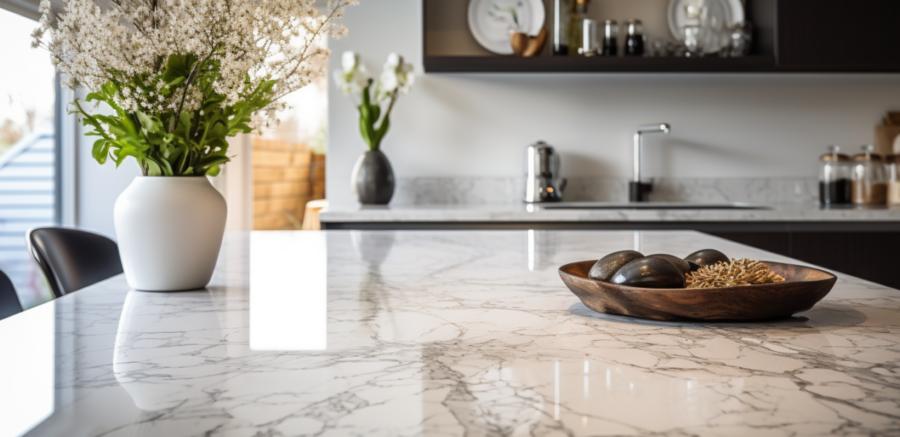Quartz Worktops: Merging Aesthetic Appeal with Functionality
 In the bustling heart of your home—the kitchen—the worktop takes center stage both functionally and aesthetically. Among the vast array of materials available for worktops, quartz emerges as a frontrunner, balancing a sleek appearance with a slew of practical benefits. This engineered stone is not only a visual delight but also a pragmatic choice for modern-day kitchens. In the following discussion, we delve into the myriad advantages of employing a quartz worktop in your culinary space.
In the bustling heart of your home—the kitchen—the worktop takes center stage both functionally and aesthetically. Among the vast array of materials available for worktops, quartz emerges as a frontrunner, balancing a sleek appearance with a slew of practical benefits. This engineered stone is not only a visual delight but also a pragmatic choice for modern-day kitchens. In the following discussion, we delve into the myriad advantages of employing a quartz worktop in your culinary space.One of the most noticeable features of quartz is its eye-catching appearance. The material exudes a luxurious and contemporary vibe, making it a popular choice among homeowners and designers alike. Quartz worktops are available in a plethora of colors and patterns, offering an extensive palette to complement any kitchen decor. The aesthetic versatility of quartz can effortlessly elevate the ambiance of your kitchen, making it a place where functionality meets style.
Beyond its visual appeal, quartz is celebrated for its durability. Engineered from a blend of natural quartz crystals and resins, this material is incredibly hard and resistant to scratches, chips, or cracks. Unlike natural stones that might have inconsistencies in their strength, quartz offers a uniform durability that stands up to the rigors of daily kitchen activities. Its robust nature extends the lifespan of your worktop, ensuring that it remains a part of your kitchen for many years to come.
Hygiene is a paramount concern in any kitchen, and here too, quartz shines. Its non-porous surface leaves no room for bacteria, mold, or mildew to harbor, making it a hygienic choice for your kitchen. Unlike other materials that may require sealing to prevent microbial growth, quartz is inherently resistant to these issues. This characteristic not only ensures a cleaner worktop but also reduces the maintenance required to keep it hygienic.
Maintenance is another arena where quartz worktops prove to be a practical choice. The requirement for upkeep is minimal, with just regular cleaning needed to keep the surface looking new. There's no need for sealing, polishing, or reconditioning, which is often the case with other natural stone surfaces. This low-maintenance nature of quartz can save you both time and effort in the long run, allowing you to focus more on your culinary adventures rather than on maintaining the aesthetics of your kitchen.
Moreover, quartz worktops are known for their resistance to stains. Thanks to its non-porous nature, common kitchen spills like oils, vinegars, and juices can be easily wiped away without leaving a stain. This resistance to staining not only keeps your worktop looking pristine but also saves you from the hassle of dealing with stubborn stains that require harsh cleaning agents.
The consistency in the pattern and color of quartz worktops is another feature worth mentioning. Unlike natural stones which have variations in color and pattern due to natural formations, quartz, being an engineered stone, offers uniformity. This consistency can be particularly beneficial if you have a specific design theme in mind for your kitchen.
Lastly, the eco-friendliness of quartz is a benefit that aligns with the growing trend towards sustainable living. The manufacturing process of quartz worktops often incorporates recycled materials, making it a more environmentally friendly choice compared to other worktop materials.
In conclusion, the adoption of a quartz worktop for your kitchen is a decision anchored in both aesthetic allure and practical advantages. Its durability, low maintenance, hygienic properties, and visual appeal, among other benefits, make quartz a worthy contender for anyone looking to enhance the functionality and appearance of their kitchen space.
Article kindly provided by shawstone.co.uk
Latest Articles
- Why Your Front Door Fails Before the Lock Does
- How Tiny Entry Points Turn Into Big Pest Problems
- Why Soil pH Matters More Than You Think for a Healthy Lawn
- Hidden Energy Loss at the Roofline and How to Fix It
- Moisture Mischief and Wooden Floors: What Your Boards Are Trying to Tell You
- Foot Traffic Maps: How to Strategically Protect High Wear Areas on Wood Floors
- Clearing the Clutter Without Losing the Plot
- Why Damp Feels Worse in Some Rooms Than Others
- The Hidden Health Benefits of a Deep Clean
- Uncommon Ways to Estimate Waste Volume Before a Cleanup Project
- How to Spot and Tackle Hidden Moisture Problems Before They Become Renovation Nightmares
- How Underground Pipe Issues Can Lead to Structural Damage
- Simple Design Tricks That Encourage Backyard Biodiversity
- Why Your Showerhead Is Suffering From a Mineral Midlife Crisis
- Gateways That Turn Heads While Keeping Your Property Safe
- Listening Pipes: Using Sound to Diagnose Hidden Home Plumbing Issues
- Small Changes That Make a Kitchen Feel Completely New
- Scents That Refuse to Leave and How to Outwit Them
- How Personalisation Makes Homewares Feel Special
- Asphalt Advantage and the HOA Budget Balancing Act
- Interior Design
- Home Improvement
- Gardening
- Home Organization
- Home Maintenance
- DIY Crafts
- Kitchen and Dining
- Bathroom Design
- Home Security
- Home Automation
- Green Living
- Home Office
- Home Decor
- Garden Design
- Pet Care
- Home Technology
- Landscaping
- Home Energy Efficiency
- Home Cleaning
- Home Safety
- Home Exterior
- Home Insulation
- Home Buying
- Home Selling
- Renting
- Tradespeople
- Garage
- Bedroom
- Painting and Decorating
- Plumbing and Drainage

